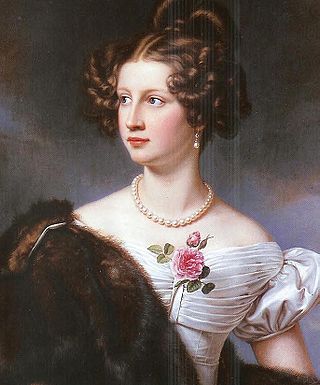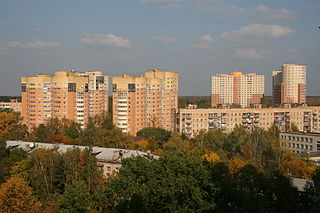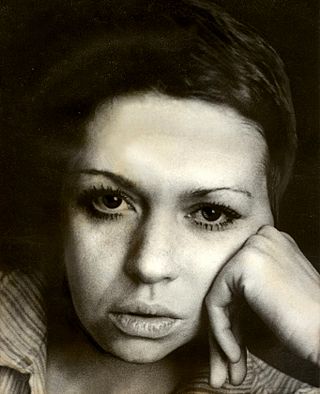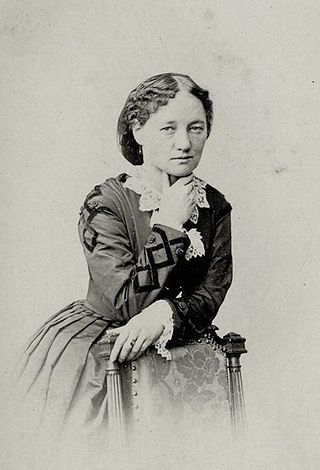
Fyodor Ivanovich Tyutchev was a Russian poet and diplomat.
Golden Age of Russian Poetry is the name traditionally applied by philologists to the first half of the 19th century. This characterization was first used by the critic Peter Pletnev in 1824 who dubbed the epoch "the Golden Age of Russian Literature."

Bolshaya Nikitskaya Street is a radial street that runs west from Mokhovaya Street to Garden Ring in Moscow, between Vozdvizhenka Street (south) and Tverskaya Street (north). Central, eastern part of the street is notable for its educational institutions and theaters, western part beyond the Boulevard Ring has many Neoclassical mansions and competes with nearby Povarskaya Street for the title of Moscow's Embassy Row.

Countess Amalie Maximilianovna Adlerberg was an illegitimate daughter of Duchess Therese of Mecklenburg-Strelitz, fathered by Bavarian diplomat Maximilian-Emmanuel Graf von und zu Lerchenfeld auf Köfering und Schönberg (1772–1809). Amalie's mother was an aunt of Empress Alexandra Feodorovna, wife of Tsar Nicholas I.
Fyodor, Fedor or Feodor is the Russian form of the name "Theodore" meaning “God’s Gift”. Fedora (Федора) is the feminine form. Fyodor and Fedor are two English transliterations of the same Russian name.



Russkaya Beseda was a Russian literary magazine founded in Moscow, Russian Empire, in 1856 by Alexander Koshelev who remained its editor-in-chief until 1858, when Ivan Aksakov joined in as co-editor. The magazine was published on a bi-monthly basis and was belonged to the Slavophile movement; most prominent in it were the literature, science and criticism sections. Selskoye Blagoustroistvo was added as a supplement in 1858–1859. Russkaya Beseda targeted for broad and mixed readership and but, frequently covered articles about the future of the Slavic peoples. Among the authors who regularly contributed to the magazine, were Sergei Aksakov, Vladimir Dal, Aleksey K. Tolstoy, Alexander Ostrovsky, Aleksey Khomyakov, Fyodor Tyutchev, Ivan Nikitin, Taras Shevchenko. It ceased publication in 1860.
The Wanderer is a poem by Apollon Maykov, first published in the No.1, January 1867 issue of The Russian Messenger. It was dedicated to Fyodor Tyutchev and subtitled: "First part of the drama The Thirsty One".

Pushkino is a city and the administrative center of Pushkinsky District in Moscow Oblast, Russia, located at the confluence of the Ucha and Serebryanka Rivers, 30 kilometers (19 mi) northeast of Moscow. Population: 102,874 (2010 Census); 72,425 (2002 Census); 75,847 (1989 Census); 57,000 (1974); 30,000 (1959); 21,000 (1939).

Nadezhda Pavlovna Kozhushanaya was a Soviet, Russian screenwriter and writer. Nadezhda said: "I live and write with love to my crazy time”. She was a philologist and a musician by education, a playwright by vocation. Although she died at the age of 44, she was referred to as “The most gifted screenwriter of the perestroika epoch”.
Events from the year 1803 in Russia

Anna Feodorovna Tyutcheva was a Russian Empire courtier, slavophile and memoirist.

The Fountain House is a palace in Russia built by the Sheremetev family, named after the nearby Fontanka river. Since its erection in 1712 the building was reconstructed several times by famous architects G. Dmitryev, Savva Chevakinsky, Fyodor Argunov, and Ivan Starov. It is also known as the Sheremetev Palace.

Tyutchevskaya is a station on the Troitskaya line of the Moscow Metro which is currently under construction. It will open in 2024.
Muranovo is a village in the Pushkinsky District, Moscow Oblast, Russia. Muranovo lies along the main road 46K–8140 and it has 11 roads in its area boundaries. Muranovo also has a church, a cafe, a park, a museum, a farm shop and a fishmonger. The memorial museum in Muranovo was created by the descendants of Fyodor Tyutchev on the basis of a family estate but in 1816, the village and consequently, the museum was acquired by Christoph von Engelhardt and his family. The museum was set on fire by a lightning strike in July 2006, but almost all its exhibits were restored, and the museum was declared open to the public again on August 1, 2015.












